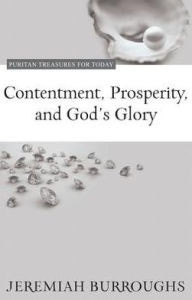Jeremiah Burroughs on Being Content When Abounding

The Puritan pastor Jeremiah Burroughs (1600–1646) is well-known for his treatment of Christian contentment, especially for being content when one has very little. His book The Rare Jewel of Christian Contentment explores that question at length. Burroughs himself experienced both times of poverty and times of plenty, and he appended a series of sermons to his Rare Jewel that focused on the second of these circumstances, a state that is applicable to many Western Christians today. This brief sermon series has been published by Reformation Heritage Books as Contentment, Prosperity, and God’s Glory.
In this book, after describing what it means to be content when one is “full,” or prosperous, Burroughs warned readers that while a prosperous condition is desirable, it often has unexpected, negative effects on one’s spiritual state:
Do you ever find it to be the case that those who did not seek God before were drawn to God by a full condition? Truly I can find no examples of this in Scripture, where the prosperous estate of a man was the occasion leading to his conversion. Therefore, that shows that there is a great deal of danger in a fuller condition.[1]
And again, he stated in stark terms,
For it would be ten thousand times better if you had never been born, even if you had a thousand times more in this world than you now have, if it proved to be your portion, your all. You are made for eternity, and those created things were not. Therefore, if your hope is in this world only, you are a wretched creature.[2]
Some might think that they are not depending on their earthly riches, but Burroughs asked whether they would remain steady if their wealth suddenly disappeared (one thinks of the dot-com bust and the real-estate crash). He continued,
Even if God does not take away your riches, just let Him alter your health and bring some pain or disease. What good will all your riches do you then? Let God but touch me in my brain, and I will not know how to make use of my estate. Or, let Him but touch me in the body—a little in the kidneys or pain in the bowels—what is the world to me then? Oh, consider the vanity and the uncertainty of all things; learning this lesson is a great help in knowing how to abound.[3]
One antidote is to acknowledge daily dependence on God:
A man who has learned to abound is as aware and sensible of his dependence on God in the height of his prosperity as he is in the depth of his adversity. Therefore even noblemen and princes, if Christ has taught them this lesson, will come daily to God’s gate in prayer to beg for their daily bread.[4]
Another way to combat the insidious reach of riches is practicing gratitude:
Oh, think this way with yourself: “What? All this and heaven too? My residence is surrounded with conveniences, but I am also surrounded with mercy wherever I am! All this and heaven, house and estate, friends, health of body, and everything I want. Oh, the greatest thing that I need is a thankful heart, for if I had but that, then I would be happy indeed.”[5]
The ultimate test is “whether you can praise God in one condition just as well as you can in another condition.” As Burroughs put it,
It is a great part of the glory of God to be unchangeable and yet to operate in the midst of changeable circumstances. Likewise, it is a mark of the excellence of God’s image in the hearts of His saints that in a variety of conditions they too would remain the same, to know how to be abased and how to abound.[6]
This gives just a taste of the kind of perspective and pastoral guidance Burroughs offers in this slim volume. It’s a good place to start before tackling his longer volume. Contentment, Prosperity, and God’s Glory provides an easy way to get into Burroughs—not to mention the spiritual writings of the Puritans—and it offers thoughtful reflection on how some Christians have applied Scripture to the real-life issue of contentment in a disgruntled, discontented world.
[1] Jeremiah Burroughs, Contentment, Prosperity, and God’s Glory, Puritan Treasures for Today 4 (Grand Rapids, MI: Reformation Heritage Books, 2013), Kindle edition, chap. 3, “Evidences of the Difficulty in Learning to Abound” section, point 3.
[2] Burroughs, Contentment, Prosperity, and God’s Glory, chap. 4, point 4.
[3] Burroughs, Contentment, Prosperity, and God’s Glory, chap. 7, point 5.
[4] Burroughs, Contentment, Prosperity, and God’s Glory, chap. 6, point 10.
[5] Burroughs, Contentment, Prosperity, and God’s Glory, chap. 9, point 7.
[6] Burroughs, Contentment, Prosperity, and God’s Glory, chap. 10.

